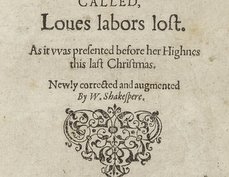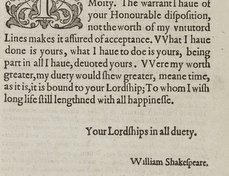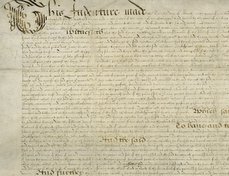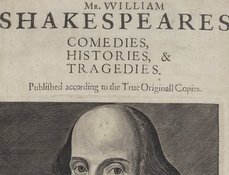Terms of use
The Bodleian Libraries, University of Oxford, has graciously contributed images of materials in its collections to Shakespeare Documented under the terms of a Creative Commons Attribution-NonCommercial 4.0 International licence. Images used within the scope of these terms should cite the Bodleian Libraries as the source. For any use outside the scope of these terms, visitors should contact Bodleian Libraries Imaging Services at imaging@bodleian.ox.ac.uk.
Document-specific information
Creator: Simon Forman
Title: The Bocke of Plaies and Notes therof per forman for Common Pollicie
Date: 1611
Repository: Bodleian Library, Oxford University, Oxford, UK
Call number and opening: MS Ashmole 208, fol. 200-207v
In the last year of his life, the astrologer Simon Forman (1552-1611) recorded his impressions of the plots and lessons of four plays he saw at the Globe, three of which were by Shakespeare: Macbeth on April 20, 1611 (he mistakenly writes 1610), a production of Richard II by an unknown playwright on April 30, 1611, The Winter’s Tale on May 15, 1611, and Cymbeline (no day or theater given). Forman’s descriptions are the most detailed surviving accounts of seeing plays in this period, and provide an invaluable eyewitness account of Shakespeare's plays as staged during Shakespeare's lifetime, as observed by a highly literate member of the audience. His notes also help establish that The Winter’s Tale was written by 1611 (it did not appear in print until the First Folio of Shakespeare's plays was published in 1623).
As the title of his manuscript suggests, Forman's notes are geared toward "common policy;" that is, useful examples of conduct for all people. They generally stress the practical or moral lessons that can be drawn from the dramatic action he summarizes, rather than reflecting his literary sensibilities. For example, Forman concludes his analysis of the Winter’s Tale with a description of the character Autolycus, a peddlar and rogue who skillfully tricks people out of money. He ends: “Beware of trusting feigned beggars or fawning felons.” (Since at least 1930, scholars have read the last phrase as “fawning fellows,” but the original manuscript makes it clear that the word is felons (spelled “fellonse”).) An exception to his interpretive strategy is Cymbeline: his notes on Cymbeline include a concise summary of most of the plot through the first four acts, but he then neglects to recount the play’s conclusion or draw any morals from the action he did record.
Simon Forman was born in the village of Quidhampton, Wiltshire, not far from Salisbury. While Forman received some basic grammar school education and spent a year or two at Oxford University in his early twenties, he left university without taking a degree and was largely self taught. He was drawn to the study of “natural philosophy,” including astrology, medicine, and alchemy, subjects that passed for scientific disciplines at the time. By the 1590s he was successfully established in London as a healer in an age when physicians still trusted in astrological calculations to predict the best times for a patient to be bled or take medicines. Forman also dabbled in necromancy. He was consulted by thousands of patients, primarily to cure physical ailments but also in the belief that his skills as an astrologer could help them find lost property or predict future events in their lives. He advised and cast horoscopes for numerous noble men and women who sought his help. Forman was badgered throughout his career by members of the College of Physicians, who resented that he successfully practiced in their profession without formal training. Forman’s medical-astrological practice made him quite prosperous, if not wealthy; he invested in real estate, had his portrait painted, married, and raised a family.
Forman's descriptions of the plays are bound with some of his other papers, including his diary with horoscopes cast for clients, dated 1570-1602, and several alchemical tracts. They were first recognized at the Bodleian Library in 1832, and their discovery was announced by John Payne Collier in 1836. In 1933, Samuel Tannenbaum argued, using a flawed paleographical argument, that they were forgeries made by Collier. This theory was later debunked, based on analysis of the manuscript and by documentation proving that Collier had only seen a transcript of the manuscript (made in 1832), rather than the manuscript itself.
[Image 1: fol. 200r]
The Book of Plays and Notes thereof, per Forman's, for Common Policy
[Image 2: fol. 201r]
In Richard the 2 at the Globe 1611 the 30 of April, Tuesday
Remember therein how Jack Straw by his overmuch boldness, not being politic nor suspecting anything, was suddenly at Smithfield Bars stabbed by Walworth, the mayor of London, so he and his whole Army was overthrown. Therefore in such a case or the like, never admit any party without a bar between, for a man cannot be too wise, nor keep himself too safe.
Also remember how the Duke of Gloucester, the Earl of Arundel, Oxford, and others, crossing the king in his humor about the Duke of Erland and Bushy, were glad to fly and raise a host of men. And being in his castle, how the Duke of Erland came by night to betray him with 300 men, but having privy warning thereof, kept his gates fast and would not suffer the enemy to enter, which went back again with a fly in his ear, and after was slain by the Earl of Arundel in the battle.
Remember also: when the duke and Arundel came to London with their army, King Richard came forth to them and met them and gave them fair words. And promised them pardon and that all should be well if they would discharge their army. Upon whose promises and fair speeches they did it, and after the king bid them all to a banquet and so betrayed them and cut off their heads etc., because they had not his pardon under his hand and seal before, but his word.
[Image 3: fol. 201v]
Remember therein also how the Duke of Lancaster privily contrived all villany, to set them all together by the ears and to make the nobility to envy the king and mislike of him and his governments by which means he made his own son king, which was Henry Bolingbroke.
Remember also how the Duke of Lancaster asked a wise man, whether himself should ever be king and he told him no, but his son should be a king. And when he had told him he hanged him up for his labor, because he should not brute it abroad or speak thereof to others. This was a policy in the commonwealth's opinion. But I say it was a villain's part and a Judas's kiss to hang the man for telling him the truth. Beware by this example of noble men and of their fair words and say little to them, lest they do the like by thee for thy good will.
In the Winter's Tale at the Globe
1611 the 15 of May, Wednesday
Observe there how Leontes the king of Sicilia was overcome with jealousy of his wife with the king of Bohemia, his friend that came to see him; and how he contrived his death and would have had his cupbearer to have poisoned, who gave the king of Bohemia warning thereof and fled with him to Bohemia.
Remember also how he sent to the Oracle of Apollo and the answer of Apollo, that she was guiltless and that the king was jealous, etc., and how except the child was found again that was lost, the king should die without issue. For the child was carried into Bohemia and there laid in a forest and brought up by a shepherd
[Image 4: fol. 202r]
and the king of Bohemia his son married that wench. And how they fled into Sicilia to Leontes, and the shepherd having showed the letter of the nobleman by whom Leontes sent was that child, and [by] the jewels found about her, she was known to be Leontes's daughter, and was then 16 years old.
Remember also the rogue that came in all tattered like colt pixie, and how he feigned him sick and to have been robbed of all that he had and how he cozened the poor man of all his money, and after came to the sheep-shearer with a pedlar's pack and there cozened them again of all their money. And how he changed apparel with the king of Bohemia his son, and then how he turned courtier, etc. Beware of trusting feigned beggars or fawning felons.
[Image 5: fol. 206r]
Of Cymbeline, King of England
Remember also the story of Cymbeline, king of England in Lucius's time: how Lucius came from Octavius Caesar for tribute and being denied, after sent Lucius with a great army of soldiers who landed at Milford Haven, and after were vanquished by Cymbeline, and Lucius taken prisoner, and all by means of 3 outlaws of the which 2 of them were the sons of Cymbeline stolen from him when they were but 2 years old by an old man whom Cymbeline banished, and he kept them as his own sons 20 years with him in a cave. And how of them slew Clotan that was the queen's son going to Milford Haven to seek the love of Innogen, the king's daughter, whom he had banished also for loving his daughter. And how the Italian, that came from her love, conveyed himself into a chest and said it was a chest of plate sent from her love and others to be presented to the king. And in the deepest of the night she being asleep, he opened the chest and came forth of it, and viewed her in her bed and the marks of her body and took away her bracelet, and after accused her of adultery to her love, etc.
And in the end how he came with the Romans into England and was taken prisoner and after revealed to Innogen, who had turned herself into man's apparel and fled to meet her love at Milford Haven and chanced to fall on the cave in the woods where her 2 brothers were, and how by eating a sleeping dram they thought she had been dead and laid her in the woods and the body of Cloten by her in her love's apparel that he left behind him and how she was found by Lucius, etc.
[Image 6: fol. 207r]
In Macbeth at the Globe 1610 the 20 of April, Saturday
There was to be observed first how Macbeth and Banquo, 2 noblemen of Scotland, riding through a wood, there stood before them 3 women fairies or nymphs, and saluted Macbeth, saying 3 times unto him, "Hail Macbeth, king of Codon [thane of Cawdor], for thou shall be a king but shall beget no kings," etc. Then said Banquo, "What, all to Macbeth, and nothing to me?" There said the nymphs, "Hail to thee, Banquo, thou shall beget kings, yet be no king." And so they departed and came to the court of Scotland to Duncan, king of Scots, and it was in the days of Edward the Confessor, and Duncan bade them both kindly welcome, and made Macbeth forthwith Prince of Northumberland, and sent him home to his own castle and appointed Macbeth to provide for him for he would sup with him the next day at night. And did so. And Macbeth contrived to kill Duncan, and through the persuasion of his wife did that night murder the king in his own castle being his guest. And there were many prodigies seen that night and the day before. And when Macbeth had murdered the king, the blood on his hands could not be washed off by any means, nor from his wife's hands which handled the bloody daggers in hiding them. By which means they became both much amazed and affronted. The murder being known, Duncan's 2 sons fled, the one to England, the
[Image 7: fol. 207v]
[other to] Wales to save themselves. They being fled they were supposed guilty of the murder of their father, which was nothing so. Then was Macbeth crowned king, and then he, for fear of Banquo, his old companion, that he should beget kings but be no king himself, he contrived the death of Banquo and caused him to be murdered on the way as he rode. The next night being at supper with his noblemen, whom he had bid to a feast (to the which also Banquo should have come), he began to speak of noble Banquo and to wish that he were there. And as he thus did, standing up to drink a carouse to him, the ghost of Banquo came and sat down in his chair behind him. And he turning about to sit down again saw the ghost of Banquo which fronted him so that he fell into a great passion of fear and fury, uttering many words about his murder, by which when they heard that Banquo was murdered they suspected Macbeth.
Then Macduff fled to England to the king's son, and so they raised an army and came into Scotland, and at Dunsinane overthrew Macbeth. In the meantime, while Macduff was in England, Macbeth slew Macduff's wife and children, and after, in the battle, Macduff slew Macbeth. Observe also how Macbeth's queen did rise in the night in her sleep and walk and talked and confessed all, and the doctor noted her words.
Image 1: fol. 200
The Bocke of Plaies and
Notes therof per formans /
for Common Pollicie
Image 2: fol. 201r
In Richard the 2 At the glob
1611 the 30 of Aprill / [planetary symbol for Tuesday]
Remember therin howe Iack strawe by his overmoch
boldnes not beinge pollitick nor suspecting Anye
thinge. was Soddenly at Smithfeld Bars
stabbed by Walworth the maior of London
soe he and his wholle Army was overthrowen
Therefore in such a case or the like, never ad
mit any party without a bar betwen for A man
Cannot be to wise, nor kepe him selfe to safe.
Also remember howe the duke of gloster. The Erell
of Arundell Oxford and others. crossing the kinge
in his humor. about the duke of Erland and Bushy
wer glad to fly and Raise an hoste of men. and
beinge in his Castell. howe the D of Erland cam by
nighte to betray him with 300 men. but hauinge
pryuie warninge ther of kept his gates faste
And wold not suffer, the Enimie to Enter, which
went back Again with a flie in his eare. and after
was slainte by the Errell of Arundell in the battell
Remember also: when the duke and Arundell cam to
London with their Army. kinge Richard came forth to
them and met them and gaue them fair wordes. And
promised them pardon and that all should be
well yf they wold discharge their Army. Vpon.
whose promises and faier Speaches they did yt and
Affter the king byd them all to A banket and soe
betraid them And Cut of their heades &c because
they had not his pardon vnder his hand & sealle be
fore but his worde/
[Image 3: fol. 201v]
Remember therin Also howe the ducke of Lankaster
pryuily contryued all Villany. to set them all to
gether by the ears and to make the nobilyty to
Envy the kinge and mislyke of him and his gouern
mentes by which means. he made his own sonn
king which was henry Bullinbrocke
Remember also howe the duke of Lankaster asked
A wise man, wher him self should ever be kinge
And he told him no, but his sonn should be a
kinge. And when he had told him he hanged
him vp for his labor. because he should not
brute yt a brod or speke ther of to others. This
was a pollicie in the common wealthes opinion
But I sai yt was a Villains parte and a Iudas
kisse to hange the man. for telling him the truth
Beware by this Example of noble men / and of
their fair wordes & sai lyttell to them, lest they
doe the like by thee for thy good will/
In the Winters Talle at the glob
1611 the 15 of maye [planetary symbol for Wednesday]
Obserue ther howe Lyontes the kinge of Cicillia was
overcom with Ielosy of his wife with the kinge of Bo
hemia his Frind that came to see him. and howe he
Contriued his death and wold haue had his cup
berer to haue poisoned. Who gaue the king of bohe
mia warning ther of & fled with him to bohemia/
Remember also howe he sent to the Orakell of appollo
& the Aunswer of apollo. that she was giltles. and
that the king was Ielouse &c and howe Except the
Child was found Again that was loste the kinge should
die with out yssue. for the Child was caried into bohemia
& ther laid in a forrest & brought vp by a sheppard
and
[Image 4: fol. 202r]
And the kinge of bohemia his sonn maried that wentch [sic]
& howe they fled into Cicillia to Leontes. and the
sheppard hauing showed the letter of the noble man
by whom Leontes sente was that child and the Ie
wells found about her. she was knowen to be leon
tes daughter and was then 16 yers old
Remember also the Rog[ue] that cam in all tottered like coll
pixci /. and howe he feyned him sicke & to haue bin Robbed
of all that he had and howe he cosoned the por man of all
his money. and after cam to the shep sher with a ped
lers packe & ther cosoned them Again of all their money
And howe he changed apparrell with the kinge of bomia [sic]
his sonn. and then howe he turned Courtiar &c/
beware of trustinge feined beggars or fawninge fellonse
Image 5: fol. 206r
of Cimbalin king of England
Remember also the storri of Cymbalin King
of England in Lucius tyme howe lucius
Cam from octauus Cesar for Tribut and
being denied. after sent Lucius with a greate
Arme of Souldiars who landed at milford
hauen. and Affter wer vanquished by Cim=
balin/ and Lucius taken prisoner and all
by means of 3 outlawes of the which 2 of them
were the sonns of Cimbalin stolen from
him when they were but 2 yers old. by an
old man whom Cymbalin banished. and
he kept them as his own sonns 20 yers with
him in A cave. And howe of of [sic] them slewe
Clotan that was the quens sonn goinge
To milford hauen to seke the loue of Innogen
the kinges daughter whom he had banished also
for louing his daughter. and howe the Italian
that cam from her loue. conveied him self
into A Cheste and said yt was a chest of plate
sent from her loue & others to be presented to the
Kinge. And in the depest of the night she be
ing aslepe. he opened the cheste & cam forth
of yt. And vewed her in her bed and the
markes of her body. & toke a wai her braslet
& after Accused her of adultery to her loue &c
And in thend howe he came with the Romaines into
England & was taken prisoner and after
Reveled to Innogen. who had turned her
self into mans apparrell & fled to mete
her loue at milford hauen & chanchsed to
fall on the Caue in the wodes wher her 2
brothers were & howe by eating a sleping
Dram they thought she had bin deed & laid
her in the wodes & the body of cloten by her.
in her loues apparrell that he left behind him
& howe she was found by lucius &c.
[Image 6: fol. 207r]
In Mackbeth at the glod 1610 the 20
of Aprill [planetary symbol for Saturday]. ther was to be obserued firste
howe Mackbeth and Bancko 2 noblemen
of Scotland Ridinge thorowe a wod the [sic] stode
befor them 3 women feiries or Nimiphes [sic]
And saluted Mackbeth sayinge .l. 3 tyms
vnto him. haille Mackbeth. king of Codon
for thou shalt be a kinge but shalt beget
No kinges &c. then said Bancko What all
to Mackbeth And nothing to me ther
said the nimphes haille to thee Banko
thou shalt beget kinges. yet be no kinge
And so they departed & cam to the Courte
of Scotland to Dunkin king of Scotes
and yt was in the dais of Edward the
Confessor. And Dunkin bad them both kind
ly wellcom. And made Mackbeth forth
with Prince of Northumberland. and
sent him hom to his own castell and ap
pointed mackbeth to prouid for him for
he wold Sup with him the next dai at
night. & did soe. And mackebeth contri
ved to kill Dunckin. & thorowe the persuasi
on of his wife did that night Murder
the kinge in his own Castell beinge his guest
And ther were many prodigies seen that
night & the dai before. And when Mack
Beth had murdred the kinge the blod on
his handes could not be washed of by Any
means. nor from his wiues handes which
handled the bluddi daggers in hiding them
By which meanes they became both moch ama
zed & Affronted. the murder being knowen
Dunckins 2 sonnes fled the on to England
the
[Image 7: fol. 207v
[other to] Walles to saue them selues. they beinge
fled they were supposed guilty of the mur
der of their father which was nothinge soe
Then was Mackbeth. Crowned kinge
and then he for feare of Banko his old
Companion that he should beget kinges
but be no kinge him self. he contriued
the death of Banko and caused him
to be Murdred on the way as he Rode
The next night beinge at supper with
his noble Men whom he had bid to a
feaste to the which also Bancco should haue
com.) he began to speake of Noble Ba
nco and to wish that he wer ther. And
as he thus did standing vp to drincke a
Carouse to him. the ghoste of Banco
came and sate down in his cheier be
hind him. And he turninge About to
sit down Again sawe the goste of banco
which fronted him so. that he fell in to a
great passion of fear & fury. Vtteringe
many wordes about his murder by which
when they hard that Banco was Murdred
they Suspected Mackbet.
Then Mack Dove fled to England to the kinges
sonn. and soe they Raised an Army And cam
into scotland. and at dunston Anyse over
thrue Mackbet. In the meantyme whille
Mackdoue was in England Mackbet slewe
Mackdoues wife & children. and after in
the battelle Mackdoue slewe Mackbet.
Obserue Also howe Mackbetes quen did Rise in
the night in her slepe & walke and talked and
confessed all & the docter noted her wordes.
Written by Folger Shakespeare Library staff with contributions by Steven W. May
Last updated May 17, 2020
















